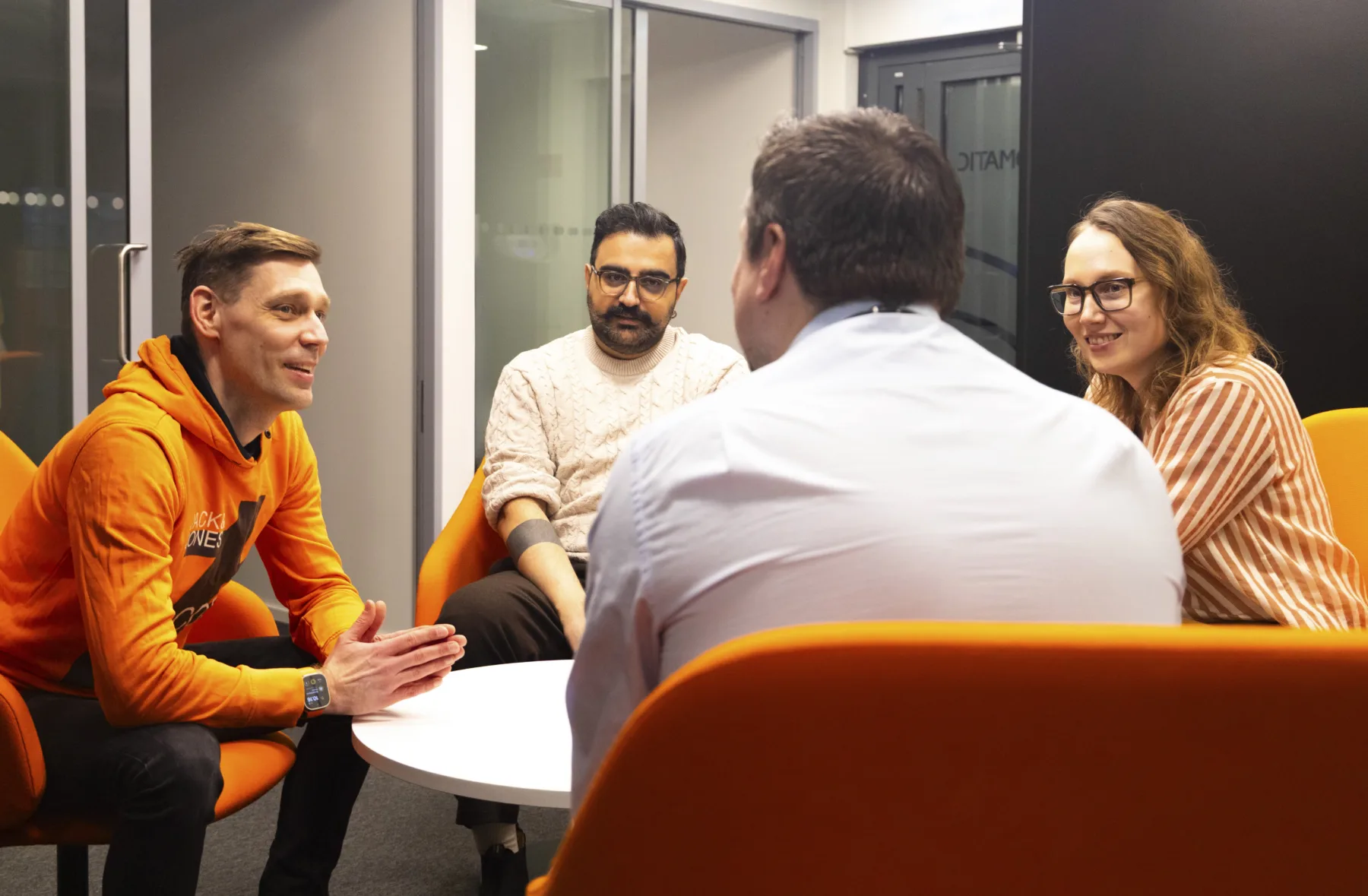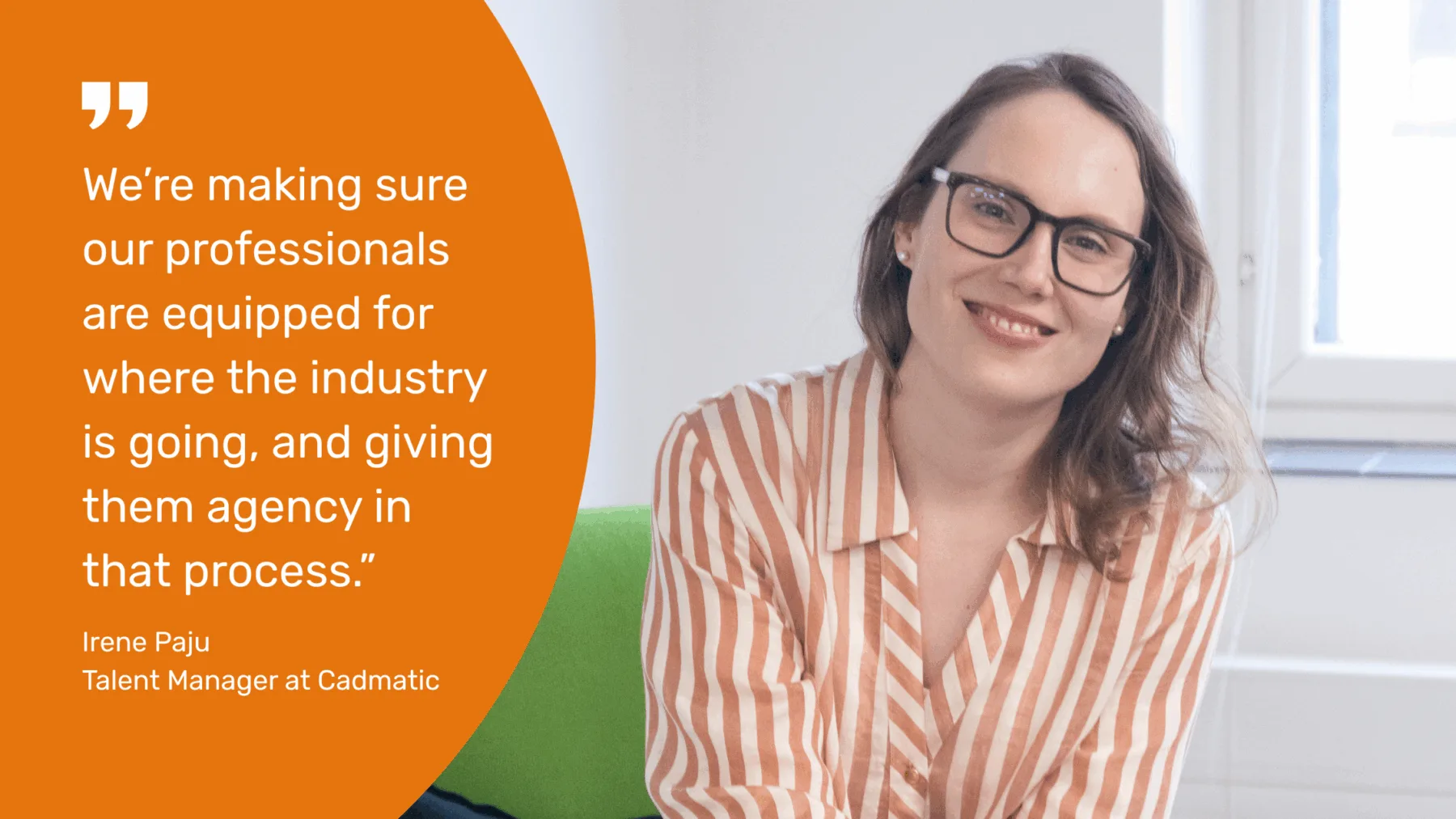Personal growth in focus: How we are empowering every expert to learn – Insights from Talent Manager Irene
What makes a company a place where experts want to stay and grow? At Cadmatic, one answer lies in how we support professional development. We want to offer you continuous development, ownership of your expertise, and support to keep evolving in a changing industry. In 2025, we launched a company-wide initiative to give every employee a personal learning plan as part of a larger shift led by Talent Manager Irene Paju and her colleagues in the global People team. So why is this a strategic priority, and what does it mean in practice for people building their careers at Cadmatic?

Why professional growth is a focus for 2025
At Cadmatic, we’ve always valued long-term expertise – many of our people have been here for a decade or more. But in recent years, something new has become clear: our teams want more structured, visible ways to keep growing.
“Through our annual engagement surveys and development discussions, we kept hearing the same message. People wanted more opportunities to develop, and more clarity on how to move forward in their roles”, Irene Paju says. She is our Talent Manager, responsible for global recruitment and performance & talent development. She’s been with the company since 2020 and is now leading the global shift toward more intentional, employee-driven learning.
That feedback shaped one of the most strategic shifts in 2025: the launch of our first global training policy, supported by personal learning plans for every employee. It’s a company-wide commitment to turn professional development from a one-off activity into a visible, ongoing process.
The decision also aligns with how we see our future. As the company continues to grow internationally, maintaining deep, product-specific knowledge and evolving technical skills becomes not just a nice-to-have, but a competitive advantage.
“This is about recognising the strength we already have inside the organisation. We’re not just offering training for the sake of it. We’re making sure our professionals are equipped for where the industry is going, and giving them agency in that process.”

How it works in practice: From policy to everyday growth
The new professional development model is designed to be both structured and flexible, a framework that gives clarity while leaving room for individual ownership.
At the core is the Individual Competence Development Plan, which is currently being rolled out across the organisation. Created as part of annual development discussions, the plan helps employees and managers identify learning goals, development methods, and the support needed, whether through formal training, mentoring, or learning by doing.
To back this up, we’ve introduced team-level training budgets and a clearer approval process to lower the threshold for taking action. The goal is to make learning part of everyday work, not something extra or separate.
“This is about building something that lasts”, Irene explains. “Each person works together with their manager to define the kind of learning that makes sense for their role, their goals, and the business.”
The entire learning model follows McCall’s, Lombardo’s & Eichinger’s 70/20/10 model with three ways to learn:
- Formal training (10%) – Webinars, courses, certifications
- Learning from others (20%) – Coaching, collaboration, mentoring
- Learning by doing (70%) – Hands-on experience, problem-solving in real projects
This breakdown, inspired by established workplace learning models, reflects how most Cadmatic experts actually grow: by solving real problems, together, over time.
“We wanted to make visible the ways people really learn here,” Irene says. “Not everything needs to be a certificate. In our environment, learning by doing is critical, but we now give it the structure and recognition it deserves.”
What kind of skills are we focusing on right now?
While learning at Cadmatic is individually driven, certain skill areas are getting special attention across the company in 2025, based on both strategic needs and employee feedback. “We’ve identified a few areas where upskilling can make the biggest impact for both individuals and the business,” Irene says.
Here’s what’s in focus right now:
#1 Transferring deep product knowledge
Some of our most experienced professionals have been shaping our products for years. Now, we’re focused on helping that know-how reach the next generation through mentoring, peer learning, and internal knowledge-sharing practices.
#2 AI awareness and application
Across functions, we’re investing in understanding how AI can support work, not just in product development, but in areas like customer support, sales, and project delivery. The goal is to help teams adopt AI as a tool that complements human expertise.
#3 Cybersecurity awareness
As we grow globally and work with increasingly complex customer environments, building baseline knowledge of cybersecurity risks and practices has become a priority for all roles.
#4 Leadership capability
For people managers, we’re offering development in coaching, communication, and supporting professional growth. This ensures that managers aren’t just leading projects, but they’re also enabling careers.
These focus areas aren’t meant to limit learning, but to guide and inspire it. Whether you’re building technical depth or shifting into new responsibilities, the message is clear: you’re supported to move forward.
“No one can afford to neglect their skills anymore. That’s why we want to help.”
In a fast-moving industry, staying still isn’t an option. We believe professional development shouldn’t be a perk, but a part of how we work.
This new approach puts that belief into action. It gives every employee, whether you’re in software, customer success, leadership or any other role, the structure and support to keep learning. It strengthens something that’s always been true here: expertise matters, and it grows best when people are trusted to lead their own path.
“No one can afford to neglect their skills anymore. That’s why we want to help. We’ve built a system that supports our people to keep evolving, and to take ownership of what they want next”, Irene sums it up.